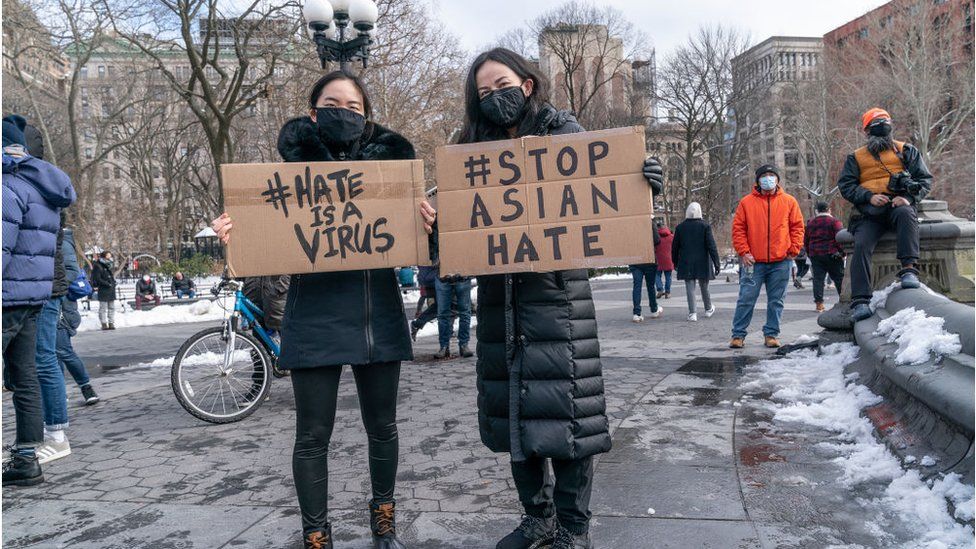On January 28, 2021, Vicha Ratanapakdee, an 84-year-old Thai man from San Francisco, was attacked and shoved to the ground in broad daylight. Days later, he died from his injuries. Over the following weeks, an Asian man was stabbed in New York City’s Chinatown, a Filipino man was slashed on the city’s subway, and most recently, Subhakar Khadka, a Nepali Uber driver in San Francisco, was assaulted by two of his passengers.
With the rise of COVID-19, which originated in Wuhan, a city in Hubei Province in China, the United States has seen a 150 per cent surge in anti-Asian hate crime over the past year, with many Asians across the country fearing for their own lives and the lives of their loved ones.
Sydney Alcantara, a woman of Chinese and Filipino descent living in Seattle, believes that not enough attention is being drawn to the issue, due in part to what she sees as a general tendency for Asians to not bring up their problems.
“I notice that Asians have just been so used to having our problems swept under the rug all the time. We’ve been kind of hard-wired to being complicit and just grinning and bearing our problems a lot, but it has the unfortunate consequence of making us invisible to others.”
Alcantara worries for her Chinese mother, who she says does not take the problem seriously enough.
“My mom, for example, thought that people got over blaming the Chinese for the COVID-19 already. She feels that she’ll be fine, but I worry about that kind of mentality because it’s part of the problem of why it happens to us and people ignore it.”
She also feels that former president Donald Trump’s rhetoric has further fanned the flames of racial conflict. “Trump’s harmful language of ‘China plague’ and ‘kung flu’ makes people feel more enabled to scapegoat all Asians with no consequence,” Alcantara says.
This wave of anti-Asian violence is not exclusive to the United States.
In Canada, anti-Asian hate crimes have also skyrocketed since the start of the pandemic. According to COVID Racism, a project initiated by Asian civic organizations throughout Canada, 868 incidents of racism against Asians have been reported as of March 12. Examples of recent racist incidents against Asian Canadians include a Korean woman who was harassed while on the TTC, and a Filipino man who was similarly threatened while taking the bus in Burnaby, British Columbia.
Susan Giang, a third-year student of Vietnamese descent studying at Ryerson University, says that these incidents have been happening well before the pandemic, but she now feels that COVID-19 has amplified racist sentiments.
“In the early stages of the pandemic, my mom was constantly looked at differently when she went somewhere. She would go to the supermarket and get stares and hear whispers from people around her. She would go pick up my sister from the daycare and hear other parents talk about her. As they were all Asian, many others in her workplace also experienced racist attacks due to the pandemic,” Giang says.
“Even before the pandemic started, I was getting targeted in the subway — someone would come up and tell me, ‘Go back to your country’ and ‘Go back to where you came from’ followed by expletives,” Giang adds.
“These encounters made my mom and I feel anxious to even step out of our homes as we thought we would be attacked. It’s even gotten to a point where I can’t leave the house unless I’m with another person. I feel like I don’t belong here, or I’m not welcome to live my life as a resident in this country,” she says.
Giang states that the ‘model minority’ myth, which generalizes all Asians as being of a higher socioeconomic status than other minorities, is partly to blame for anti-Asian sentiments and hate crimes, as well as the lack of attention to the racial problems within Asian communities.
“This makes the general population forget about Asian refugees or second and third-generation Asians and their struggles. Society no longer views Asians as a vulnerable group, which desensitizes them to the violence against Asians,” she says.
The myth has also served to amplify racial strife between other racialized communities and Asians. “It seems that people of all colours are attacking Asians and the news doesn’t want to even poke that topic with a stick,” Alacantra says.
However, Giang says that it is important for Asians to stand in solidarity with other racialized communities in order to bring awareness to anti-Asian racism.
“As the new generation, we — along with the media — should do our part and actively speak against these attacks, but in an unbiased manner. Other forms of racism exist — all people of colour are disadvantaged by white privilege. To acknowledge discrimination against Asians, we must also recognize the Black, Indigenous, and Latin communities’ struggles to this day. We must not compare people of colour’s struggles as it is crucial for us to stand together in solidarity.”
On March 11, President Joe Biden denounced the rise in anti-Asian hate crimes, calling it un-American. In a similar display of solidarity, former Whitby MP Celina Caesar-Chavannes said in a Q&A session at the Glendon campus on February 23 that there is “no time for this divisiveness amongst racialized individuals.” Increased awareness amongst other ethnic groups have allowed discussion around the issue to gain traction.
“We need to let the world know we are not invisible,” Alcantara says. “Our problems are valid and real, and we can’t give up until more people know we are just as human as everyone else.”


